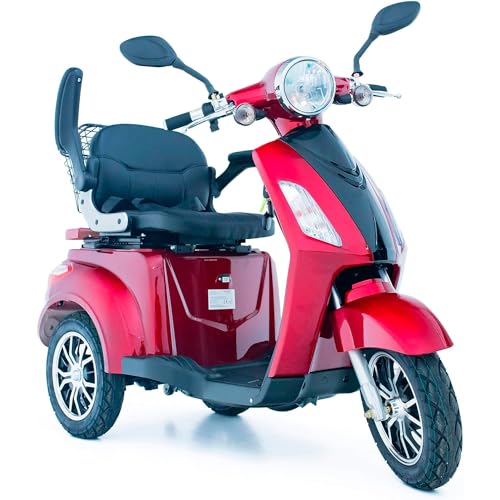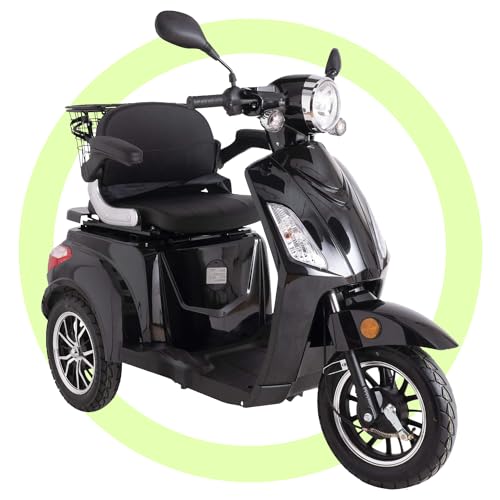5 Killer Quora Answers On Mobility Power
페이지 정보
작성자 Clinton Duncomb… 작성일 25-01-05 20:25 조회 4 댓글 0본문
 Types of mobility power (parker-Romero-2.federatedjournals.com)
Types of mobility power (parker-Romero-2.federatedjournals.com) Many people with mobility disabilities benefit from assistive devices, such as crutches, canes, braces as well as wheeled walkers and manual wheelchairs. Eventually, some individuals who have mobility issues may need to consider powered mobility devices.
Many people with mobility disabilities benefit from assistive devices, such as crutches, canes, braces as well as wheeled walkers and manual wheelchairs. Eventually, some individuals who have mobility issues may need to consider powered mobility devices.A test to determine if you are ready to use a power mobility device can be done by an occupational or physical therapist.
Wheelchairs powered by electricity
Powered wheelchairs allow locomotion for those who have difficulty to maintain an upright position with a manual wheelchair. Unlike scooters, power wheelchairs can be used indoors and outdoors, allowing users to travel greater distances than can be covered on foot. Therapists can choose a variety of power wheelchairs based on the client's medical, functional and environmental needs. Power wheelchairs can include features such as a power tilt, power recline, and/or an foot platform that is articulating to enhance the functional independence of the user.
Generally, a power wheelchair is designed to allow the user to remain in a straight position and uses long-lasting rechargeable batteries. Most insurance companies will reimburse the cost of a wheelchair when it is required by medical reason to carry out mobility-related daily living activities (MRADLs). Medicare part B covers the majority of power wheelchairs provided that they meet certain requirements. This includes a face-to-face appointment with a doctor on the list approved by the insurer and an evaluation by an occupational specialist.
Some power wheelchairs come with smaller motors and are designed for indoor use. This allows them to move more easily in smaller areas. On contrary, some power chairs are built to be used indoors as well as outdoors, and feature larger motors for improved control and traction. A lot of power wheelchairs require an extra lift to be carried in order to maneuver around obstacles outdoors.
There are a variety of options and modifications that are available for power wheelchairs, including programmable electronics that can control the speed of the motors as well as a track system to aid in maintaining an upright path through uneven terrain, and many other upgrades. Some power wheelchairs offer the option of tilting in space for users who are unable to maintain their upright position for extended periods of time, which can ease pressure points and improve circulation.
Some power wheelchairs come with removable parts, such as the motors and battery to make transportation easier. Some models have a foldable frame for storage in the back of a vehicle or van. Some medical supply stores provide the possibility of renting a power chair before purchasing one. The rental cost is often applied to the purchase cost.
Powered Scooters
Powered scooters provide the ability to ride in a quiet and smooth manner. They're typically smaller than a motorbike, and are suitable for those with limited upper body strength or extensive accessibility needs. They are also less cumbersome to store and are more maneuverable than a wheelchair. They are green power mobility scooters any good suitable for short or medium range travel and are a popular choice for kids and teens.
Unlike power wheelchairs, electric scooters can be operated by hand or foot. They come with a step-through frame and a handlebar setup to steer. A small battery powers a motor in the deck's base. The motor can be chain or direct driven, based on the scooter.
The best green electric scooter scooters are able to cater to the widest range of users and environments. Some of the most highly rated models can reach speeds up to 15mph on flat, stable surfaces. Other models can drive up to 10 miles on one charge. These scooters are perfect for those who are able to walk a short distance but require assistance in navigating difficult terrain or hills.
Many electric scooters feature a "grip twist" throttle that requires the user to continuously hold down on the button or a light gray rotating handlebar. This ensures that the motor is always generating power and prevents children from accidentally removing their hand and creating a sudden, jarring jolt. Many models also include another safety feature known as "kick to start" that requires the child to start the scooter before the motor starts to kick in.
Some scooters come with a chain drive that allows the motor spindle engage directly with rear wheel. This is a common type of scooter, especially for children's models, because it allows the rider to easily get up to speed without the need to pedal.
Other kinds of scooters rely on an electronic controller that converts inputs from the brake and accelerator controls into current which is then delivered to the motor. This is known as a speed control and can vary from model to model. It is essential to choose an electric scooter with a top-quality speed controller that's suitable for the purpose of.
Bicycles with a motor
E-bikes provide a convenient, healthy, low-carbon alternative to automobile transport and can provide an increase in mobility for people with physical limitations. While traditional bicycles require all the power of a human to move, e-bikes feature a built-in electric motor that assists your pedaling and allows you to ride further and climb hills without exhaustion. Every major bike manufacturer and even car manufacturers are now involved in the e-bike market making bikes that meet the needs of many different types of riders.
The most commonly used design for an e-bike includes an engine housed within the frame (typically known as a mid-drive motor) or in the cranks, or the front or rear hub. The motor drives wheels via the chain or gears. You can select several settings to decide how much assistance you get. The motor comes with an electronic torque sensor that can gauge your pedaling force and adjust accordingly. This means you get more power when you pedal hard and less power when you don't.
Pedal-Assist Mode
Many e-bikes come with multiple modes, allowing you to alter the amount of power the motor produces. In class 1 mode, the motor only generates power when you pedal which makes cycling easy and allowing you to travel farther and climb hills without difficulty. In class 2 mode, the motor gives power at a constant level, while in class 3 mode, you are able to utilize the throttle to achieve speeds up to 28 mph.
E-bikes are not without their problems. Environmentalists point to the emissions and resource depletion that may occur during production, while trail advocates are concerned about the impact of e-bikes on trails. Some are concerned about safety concerns, particularly the potential for accidents with e-bikes sharing the road with traditional bicycles.
To reduce these risks the policymakers must make modifications to improve the safety and sustainability of e-bikes. For instance, requiring ebikes to comply with stringent battery safety standards can help reduce the chance of explosions and fires. Furthermore, providing E-bike safety training and including e-bikes in public education programs can help spread awareness of bike safety and ensure that riders are aware of how to safely operate these vehicles.
Vehicles Powered by Electric Power
Vehicles powered by electricity (EVs) that are electric vehicles, make use of an electrical motor to power the wheels. They can run on pure electricity that could be generated by fuel or a battery cell, or they can be hybrid electric vehicles that use both an internal combustion engine as well as an electric motor. Other kinds of electric vehicles include battery electric scooters, motorcycles and bicycles, electric neighborhood vehicles, golf carts, forklifts and commercial vehicles that are utilitarian, such as milk floating and transit buses.
Electric vehicles are the future of transportation and are already gaining in popularity. According to McKinsey's analysis the global market for electric vehicles will double between 2021 and 2030. To sustain this growth, governments and companies will have to answer a number of questions, including:
How can we power EVs cleanly?
Unlike traditional fossil-fuel cars, EVs produce no harmful tailpipe emissions. They rely on the grid to charge and this is a major issue as the energy industry shifts towards renewable energy. As EVs become more common and more widespread, they will require faster and more frequent charging, putting pressure on the grid infrastructure.
As part of the efforts to clean up mobility power scooters, countries need to construct more charging stations. These stations, referred to as EV Charge Points, Chargepoints, or Electric Vehicle Supply Equipment (EVSE) convert high-voltage electrical power into DC power of lower voltage to charge the batteries of electric vehicles. The power can also be used to control vehicle accessories and power the motors for traction.
The traction motor of an EV is a strong motor that drives its wheels. The traction battery is used to generate energy. It can be charged externally or internally. The traction battery is made up of individual modules, each one containing a number of smaller cells that are connected together to form a larger pack. The system's sensors and chemistry constantly monitor and balance the pack to ensure that it is operating at its best.
HEVs, also known as plug-in hybrid electric vehicles, combine the advantages of a traditional gas engine with the benefits of an electric motor. They can travel short distances using electricity however, they can only do so at higher speeds. They make use of a variety of hybrid features, such as idle-start-stop technology, engine power-assist and brakes that are regenerative. Mild HEVs utilize the full range of hybrid vehicle technologies, while full or strong HEVs are capable of driving with just the motor that traction operates at lower speeds.
- 이전글 Grasp (Your) How To Buy Gold in 5 Minutes A Day
- 다음글 How Replacement Sealed Units Influenced My Life For The Better
댓글목록 0
등록된 댓글이 없습니다.
